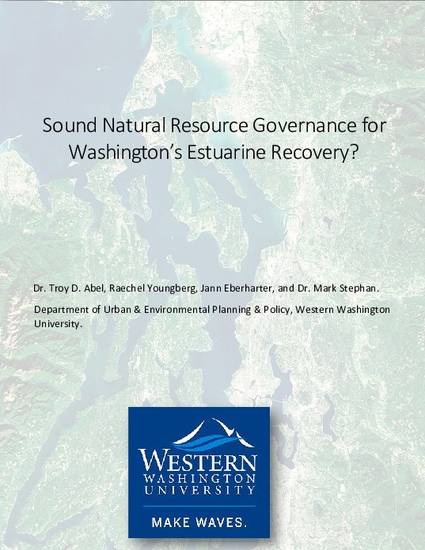
Other
Sound Natural Resource Governance for Washington’s Estuarine Recovery?
(2022)
Abstract
Puget Sound recovery efforts were past due for a Common Pool Resource (CPR) diagnosis. Most of our focus group participants reported negative recovery experiences. Many expressed concerns about fragmentation among thefourkeygoverningarenas.Practitionersmostlyworkseparatelytocoordinateecosystemrecovery,manage growth, direct transportation projects, and oversee forestry. But the voluntary and collaborative approaches to Ecosystem-Based Management (EBM)for Puget Sound violated three key design principles of CPR theory. First, Puget Sound salmon recovery and restoration uniformly relied on a collaborative governing strategy instead of developing diverse institutional rules. Second, fragmentation among four governing arenas impacting Puget Sound health thwarted effective coordination. Third, Puget Sound Partnership’s (PSPs) land cover and development indicators provided unreliable and invalid measures of habitat loss versus gains. We conclude with three policy prescriptions based on our research from the last year. First, Puget Sound stakeholders should recognize the value of hybrid policy strategies rather than relying solely on collaborative EBM for recovery efforts. Second, local stakeholders need not wait on legislative action. Salmon recovery and Net Ecological Gain could be incorporated into current planning practices and comprehensive plan updates. Third, recovery and restoration practitioners should utilize the High-Resolution Change Detection (HRCD) tool to assess both land cover development and restorations to better assess ecological gains and losses at multiple scales.
Keywords
- environmental governance,
- Puget Sound,
- Common Pool Resources,
- policy analysis
Disciplines
Publication Date
Summer September 8, 2022
Comments
This report was developed under Assistance Agreement No. KC-529-20 between Kitsap County and Western Washington University. The funding originated from the Washington Department of Ecology Agreement No. WQNEP-2019-KiCoCD-00005 and the Natural Estuary Partnership (NEP) of the U.S. Environmental Protection Agency (EPA). It has not been formally reviewed by EPA or the Department of Ecology. The views expressed in this document are solely those of Dr. Troy D. Abel, Raechel Youngberg, Jann Eberharter, and Dr. Mark Stephan and do not necessarily reflect those of the EPA, Department of Ecology, or Kitsap County. EPA does not endorse any products or commercial services mentioned in this publication.
Citation Information
Troy D. Abel, Raechel Youngberg, Jann Eberharter and Mark Stephan. "Sound Natural Resource Governance for Washington’s Estuarine Recovery?" (2022) Available at: http://works.bepress.com/troy_abel/34/
Creative Commons license

This work is licensed under a Creative Commons CC_BY-NC-ND International License.
